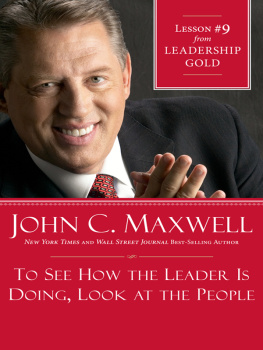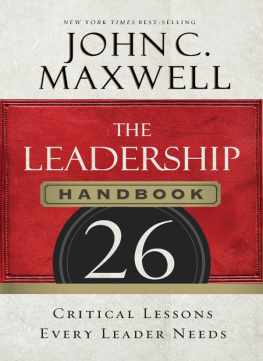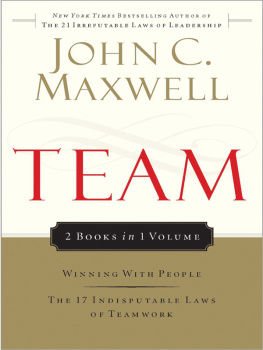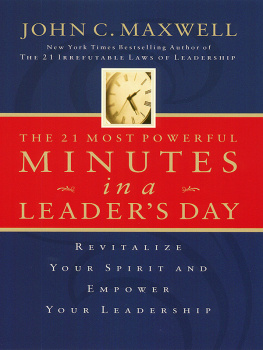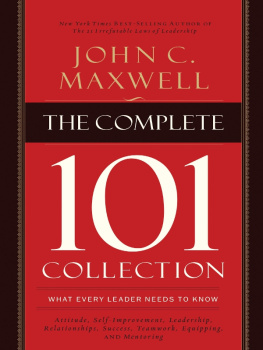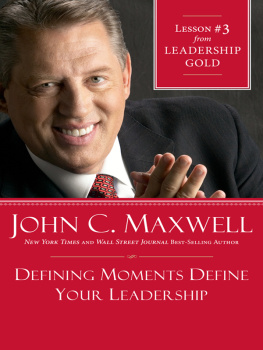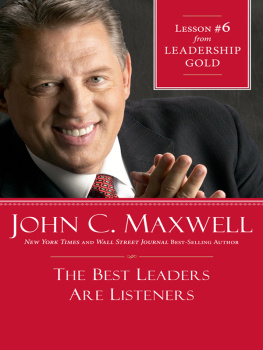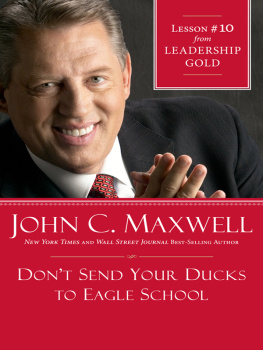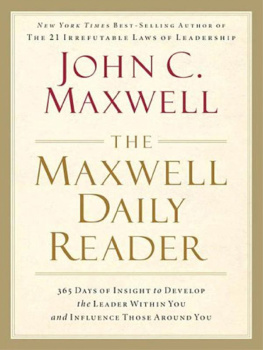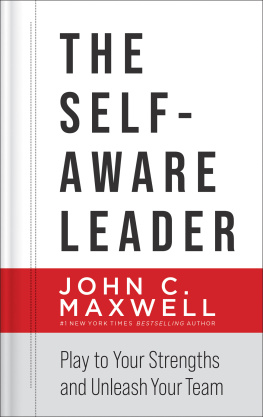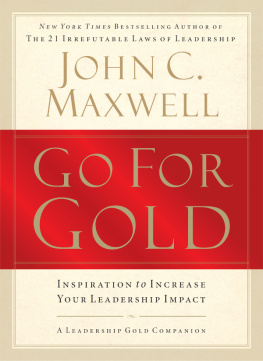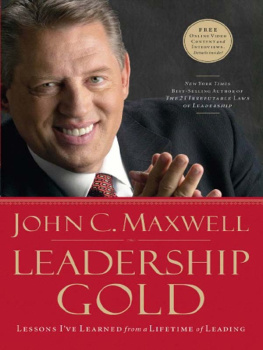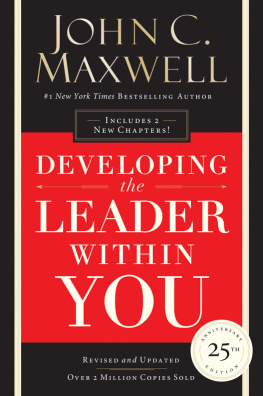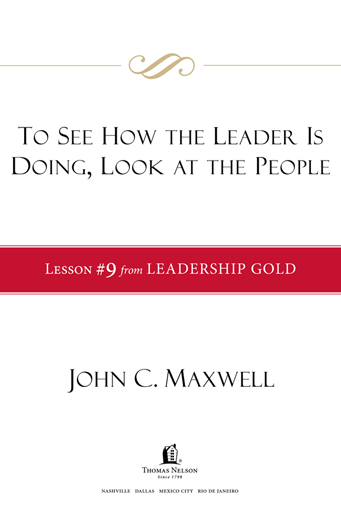
2008, 2012 by John C. Maxwell
This ebook is derived from Leadership Gold, by John Maxwell, 2008, 2012 by John C. Maxwell.
All rights reserved. No portion of this book may be reproduced, stored in a retrieval system, or transmitted in any form or by any meanselectronic, mechanical, photocopy, recording, scanning, or otherexcept for brief quotations in critical reviews or articles, without the prior written permission of the publisher.
Published in Nashville, Tennessee, by Thomas Nelson. Thomas Nelson is a registered trademark of Thomas Nelson, Inc.
Published in association with Yates & Yates, www.yates2.com.
Thomas Nelson, Inc. titles may be purchased in bulk for educational, business, fund-raising, or sales promotional use. For information, please e-mail SpecialMarkets@ThomasNelson.com.
ISBN: 978-0-7852-1411-3 (hardcover)
ISBN: 978-1-4185-7113-9 (ebook)
ISBN: 978-1-4002-7543-4 (ebook of chapter 9)
CONTENTS
DEDICATION
Leadership Gold is dedicated to Ella Ashley Miller, our fourth
grandchild. Her gentle nature continually draws us to her. We pray that
as she grows older she will mine the gold out of the lessons of life.
Thank you to
Charlie Wetzel, my writer
Stephanie Wetzel, who proofs and edits the manuscript
Linda Eggers, my assistant
TO SEE HOW THE LEADER IS
DOING, LOOK AT THE PEOPLE
In the mid-1970s, I attended a conference where Lee Roberson was a speaker. He made a statement during a session that inspired me and changed my life. Roberson said, Everything rises and falls on leadership. By that he meant that leaders inevitably make things better or worse for the people who follow them. Wherever you have a good leader, the team gets better, the organization gets better, the department or division gets better. And wherever you have a bad leader, everyone that leader impacts has a tougher time. Leadership makes every endeavor either better or worse.
The moment I heard that statement, I understood intuitively that it was true. That statement soon became my theme. It has been a major inspiration and motivation for me for more than thirty years. It has been the foundation of the 21 Irrefutable Laws of Leadership, including the Law of the Lid, which states, Leadership ability determines a persons level of effectiveness. And it has influenced how I see everything that happens around me.
THE LEADER IS RESPONSIBLE
The more you understand leadership, the more you see how leaders impact things around them. A few years after I heard Roberson speak, along with millions of other Americans I watched Jimmy Carter and Ronald Reagan debate prior to the 1980 presidential election. Most people agreed that the debate turned on a question that Reagan asked the American people. He said,
Next Tuesday is Election Day. Next Tuesday all of you will go to the polls and stand there in the polling place and make a decision. I think when you make that decision it might be well if you would ask yourself, Are you better off than you were four years ago? Is it easier for you to go buy things in the store than it was four years ago? Is there more or less unemployment in the country than there was four years ago? If you answer all those questions yes, why, then I think your choice is very obvious as to who youll vote for. If you dont agree, if you dont think that this course that weve been on for the last four years is what you would like to see us follow for the next four, then I could suggest another choice that you have.
Why would that questionAre you better off than you were four years ago?have such an impact? Because people understood that their current condition was the result of who their leader was. They didnt like their condition, so they changed leaders. Its what got Reagan elected. And its why I say that to see how the leader is doing, all you have to do is look at the people. As leadership expert Max Depree says, The signs of outstanding leadership appear primarily among the followers.
People often attribute the success of organizations and teams to many things: opportunities, the economy, personnel, teamwork, resources, timing, chemistry, luck. And while its true that any of those things can come into play, the one thing all good organizations have in common is good leadership.
Have you noticed that whenever you go to a new doctor, you have to fill out forms and answer a bunch of questions? Although they may seem trivial or irrelevant, the most important questions are those dealing with your family history. Why? Your physical health is greatly determined by your parents physical health. If one of your parents has heart disease, diabetes, or cancer, there is a high likelihood that you will someday have it too. Your health has been passed down to you.
Leadership works in a similar way. When leaders are healthy, the people they lead tend to be healthy. When leaders are unhealthy, so are their followers. People may teach what they know, but they reproduce what they are.
Recently I spoke at a conference with Larry Bossidy, the former CEO of AlliedSignal and author of Execution. He touched on this dynamic between leaders and followers, and spoke about the important role leaders have with their people. He said,
The development of new leaders is not only the key to profitability, it is also very satisfying in terms of feeling like youve left a legacy, not just an income statement. The question is often asked, How am I doing as a leader? The answer is how the people you lead are doing. Do they learn? Do they manage conflict? Do they initiate changes? You wont remember when you retire what you did the first quarter of 1994. What you will remember, is how many people you developed.
The best leaders are highly intentional about developing their people. But good or bad, leaders always impact their people. And if you want to know whether a leader is successful and effective, dont look ator listen tothe leader. Simply look at the people.
REVEALING QUESTIONS TO ASK ABOUT FOLLOWERS
Earl Weaver, the former manager of the Baltimore Orioles, was known for continually baiting and arguing with umpires. One of the standard questions he asked of umpires in the first few innings of a game was, Is it going to get any better, or is this as good as its going to get? Thats a question every leader should ask himself. Why? Because the performance of the leader will greatly impact the performance of the team.
If you want to know how youre doing as a leader (or if you want to analyze the leadership of someone else in your organization), do it by asking the following four questions:
Question #1: Are the people following?
All leaders have two common characteristics: first, they are going somewhere; second, they are able to persuade other people to go with them. In a very practical sense, the second characteristic is what separates the real leaders from the pretenders. If someone with a leadership position has no followers, then that person has a position but isnt really a leader. There is no such thing as a leader without followers!
Its important to note that having followers doesnt necessarily make individuals good leaders; it just makes them leaders. Pastor Stuart Briscoe tells the story of a young colleague who was officiating at the funeral of a war veteran. The dead mans military friends wanted to have some role in the service at the funeral home, so they requested that the pastor lead them down to the casket, stand with them for a solemn moment of remembrance, and then lead them out through the side door.
The young pastor did exactly that. There was only one problem: he picked the wrong door. With military precision, he marched the men into a broom closet. The whole group then had to beat a hasty, confused retreat, in full view of the mourners.
Next page
